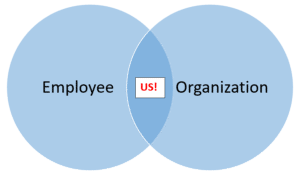The You, Me and We of Career Development
I’ve mentioned before that I have a tendency to stockpile magazines so I can read during flights. This time of year is conference season which tends to be my busiest, with a lot of travel from September through the end of the year.
Well, this year I have even more travel than usual. During a recent flight, I was reading some old issues of Training Magazine on my way to Austin for the Great Place to Work’s Small and Medium Business Conference and it occurred to me that today’s career development efforts can be summarized into three areas of responsibility.
You. Since I’m a human resources pro, I’m going to say “you” is the employee. The employee has some responsibility in developing their career. First, employees need to understand and communicate what they want to do with their career. They also need to share what things they are willing to do on their own and where they need help from their employer. Employees should regularly evaluate their career goals, tell the company when they don’t feel their goals are being met, and work with the organization to develop a solution to the situation.
Me. This is the company. It includes HR and the employee’s manager. The organization has obligations where an employee’s career is concerned. It starts during the hiring process, where we often talk about the future. We have a responsibility to train employees for their current roles. It’s in the company’s best interest to develop employees for future openings as others leave or retire. We also should tell employees when the company isn’t able to support an employee’s future goals.
We. And this is our combined efforts. Not only the training and conversations I’ve mentioned, but a partnership between employees and managers to create positive, rewarding careers. The company’s career development programs and processes need to work. Everyone needs to be accountable. Because when they are, the organization can hire the best talent and employees can achieve their professional goals. Everybody wins, including candidates who want to know that, if they come to work for the company, the organization will partner with them.
The focus here has to be on the WE. Organizations must make career development conversations a part of their culture. Employees must know what’s expected of them when they get hired. So the partnership needs to be a part of the pre-hire conversation. The last thing an employee wants is to get hired and say, “I didn’t know the company wasn’t going to develop me.” And the company doesn’t want to think, “I didn’t realize the employee wasn’t going to own their career.” Assumptions cannot be made about the career development partnership.
As the talent wars heat up, organizations might choose to hire candidates and develop their skills. This makes the career development conversation even more important. Having honest, two-way communication about careers and the future creates buy-in from everyone.
Image taken by Sharlyn Lauby in a courtyard of Caesar’s Palace during a recent Lunar New Year
2